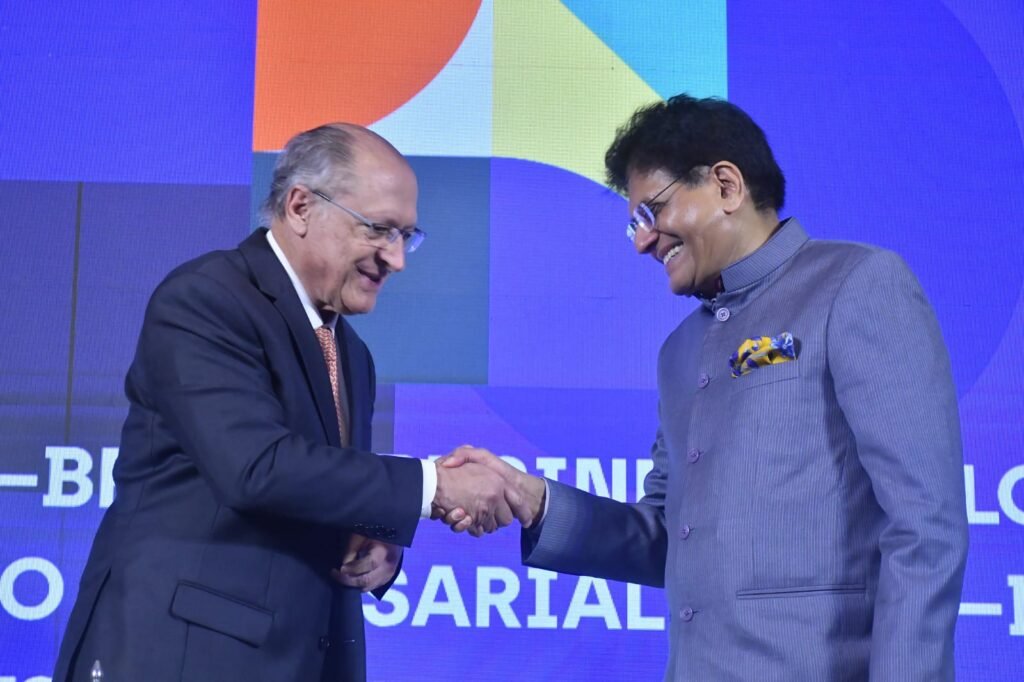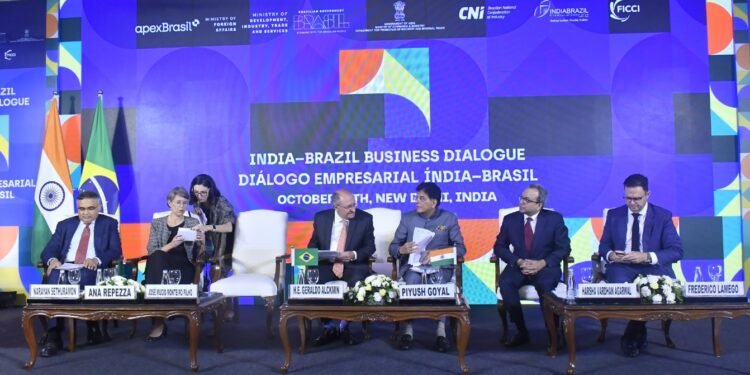NEW DELHI: The India–Brazil relationship is entering a decisive phase one that goes far beyond diplomatic courtesies and symbolic summits. It is becoming a cornerstone of the new global economic order being shaped by the Global South. As both nations recalibrate their economic and trade strategies amid shifting geopolitical alignments, their convergence is driven not by convenience but by a shared vision: to assert autonomy, build resilience, and redefine global trade flows on more equitable terms.
The recent visit of Brazil’s Vice President and Minister of Development, Industry, Trade and Services, Geraldo Alckmin, to New Delhi brought this vision to the forefront. His statement that “India and Brazil do not compete but complement each other” captured the essence of a partnership built on mutual strengths, India’s manufacturing, digital, and innovation ecosystem on one side, and Brazil’s natural resources, agricultural base, and industrial capacity on the other. Alckmin’s announcement that bilateral trade, which stood at $12 billion in 2024, is expected to surpass $20 billion by 2030, represents both ambition and strategy.
For Brazil, deepening trade with India is a way to rebalance its economic dependencies. Traditionally tied to Western and Chinese markets, Brazil now seeks to diversify through strategic partnerships with countries that share its developmental priorities. India fits that mould perfectly a democracy with scale, demand, and technology that complements Brazil’s industrial and resource potential. The Vice President’s emphasis on broadening the Preferential Trade Agreement (PTA) and advancing frameworks on investment facilitation and double taxation avoidance reflects a clear intent to institutionalize this partnership within a stable and predictable policy structure.
The significance of this move is not limited to numbers. It points to the gradual creation of a South–South economic corridor a network that connects resource-rich Latin America with technology-rich South Asia. Alckmin’s remarks about inviting Indian investments in automotive, renewables, clean energy, healthcare, aerospace, agriculture, semiconductors, and digital innovation highlight the convergence of two complementary growth models. Both nations are betting on industrial diversification, energy transition, and innovation as drivers of long-term prosperity.
Perhaps the most forward-looking element of Alckmin’s address was his reference to launching a Brazil–India digital partnership focusing on artificial intelligence, high-performance computing, and start-up ecosystems. This initiative signals a new phase in South–South collaboration, where the agenda is no longer limited to trade in commodities but extends to co-creating digital and green technologies. The Vice President’s framing of this initiative as a step toward “technological sovereignty” is geopolitically significant. It underscores a growing realization across the Global South that economic independence in the 21st century will hinge not only on trade diversification but also on the capacity to generate and control technology.

For India, the renewed engagement with Brazil strengthens its strategic reach across the Atlantic. Commerce and Industry Minister Piyush Goyal reaffirmed India’s long-term economic trajectory, highlighting that the nation is poised to remain the fastest-growing major economy for the next two decades, with the IMF projecting 6.6% GDP growth for 2025. India’s confidence in its growth story underpinned by infrastructure expansion, digital transformation, and policy stability provides the credibility needed to anchor new trade partnerships.
Goyal’s articulation of India’s three growth pillars – strong macroeconomic fundamentals, modern infrastructure, and improved quality of life, mirrors the structural ambitions of Brazil under President Lula da Silva’s administration, which is focused on reindustrialization, social inclusion, and environmental sustainability. The resonance between the two development models offers a foundation for a deeper economic partnership.
Beyond trade and investment, the India–Brazil partnership carries clear geopolitical weight. As members of BRICS, IBSA, and the G20, both countries have repeatedly advocated for a more balanced global order and fairer representation of developing economies in global decision-making. Their trade collaboration thus extends into a broader framework of global economic reform a push to reduce dependence on Western-dominated financial systems and to promote south-driven growth narratives.
The focus on energy, food security, and clean technologies further reflects how trade is being aligned with global sustainability goals. Brazil’s vast renewable energy base and India’s leadership in green technology could become a defining axis in the global energy transition. Together, they can shape supply chains that are both sustainable and equitable an approach that offers an alternative to the extractive economic models of the past.
The road ahead, however, demands institutional commitment. Both nations must translate intent into action through sustained business engagement, sector-specific task forces, and long-term trade facilitation mechanisms. Simplifying customs processes, harmonizing standards, and ensuring faster market access will be critical. The success of the India–Brazil partnership will depend not just on government agreements but also on how effectively businesses from both sides perceive and act on the opportunities being created.
Yet, what stands out most from this renewed dialogue is the political and strategic confidence underlying it. India and Brazil are no longer content with being peripheral players in global trade; they are actively shaping it. As global economic gravity shifts east and south, their partnership could emerge as one of the most consequential alliances of the coming decades.
In many ways, the India–Brazil trade partnership represents a microcosm of the Global South’s new diplomacy pragmatic, forward-looking, and grounded in shared development goals rather than ideological alignment. It is a partnership that combines economic logic with strategic vision, a model for other emerging economies seeking to build collective strength in a rapidly changing world.
If nurtured with consistency and long-term perspective, this partnership could become a vital link between Latin America and Asia a bridge across oceans and mindsets, redefining not only how trade is done but how global growth itself is imagined.
– Dr. Shahid Siddiqui; follow via X @shahidsiddiqui



















